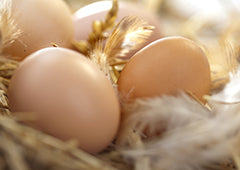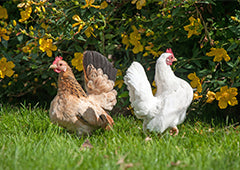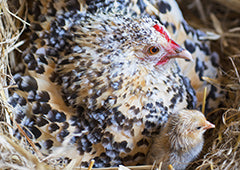Hello chicken keepers!
Here at Backyard Chicken Coops we love to let our chooks free-range. For us, this means letting the girls out into the yard to stretch their wings, and scratch to their heart’s content. This is the image most backyard chicken keepers have when they think of free-ranging. Unfortunately, that beautiful word doesn’t have the same meaning when you step into the supermarket. Instead, if you want delicious eggs from happy hens, you’ll need to get a flock of your own ladies, or buy ‘pastured’. Pastured? What the peck is all the fuss about?
The meaning of free-range
Labelling an egg product as ‘free-range’ is simply a matter of stocking density. A free-range egg laying operation can keep a maximum of 10,000 laying hens per hectare - which translates to 1 hen per square metre. Hardly any space at all!
Additionally, this prescription is only for the amount of space provided, and does not require all the space to be used, nor for the chickens to actually go outside. In practice this means that many ‘free range’ operations keep their chickens in large open sheds surrounded by rocky ground. With pickings that bad, there is very little incentive to actually get out and flap about.
The meaning of pastured
By comparison, pastured egg layers are kept with a stocking density of up to 1,500 laying hens per hectare. Nearly 7 square metres per chook - now we’re clucking! Additionally, pastured eggs have passed minimum certification requiring them to go outdoors, and have ample foraging time. The end result are more ethical, sustainable, and of course, tastier eggs.
What about cage-free?
The term cage-free means just that, and nothing more - the chickens haven’t been kept in cages. However, you can be sure that these eggs exceed free-range stocking density - chances are these chooks are so cramped they may as well be in a cage!
Other terms
‘RSPCA certified’ means that eggs have met some basic standards of care set by the RSPCA. The official ‘certified organic’ logo means that eggs have a maximum stocking density of 2,500, and that both chickens and eggs are free of artificial nasties. Merely stating ‘organic’ might only mean that organic feed is used.
‘Vegetarian’, ‘eco eggs’, ‘omega 3 eggs’ and other similar terms don’t really mean anything. All eggs are vegetarian, ecological, and contain omega 3!
So what type of eggs are best?
When you have a flock of your own backyard gals, you are in charge of providing egg-cellent conditions for egg laying. Do that, and you’ll be rewarded with scrumptious eggs that are both ethical, and fresh as they come. Step one? Get a comfy, quality coop for your chickens!
Home-laid eggs are often the best and one of the biggest benefits of keeping chickens is having a great supply of fresh eggs for baking, breakfasts and all manner of delicious meals. However, in order to get a frequent, fresh supply of eggs, keepers need to look after the chickens that lay them. There can be multiple issues that are stopping your ladies from laying which is stressful for them and for you!
Don’t worry though – the eggsperts at Chickenpedia have cracked it! They have created the Eggs in Your Basket course to help you, help your ladies lay successfully. Discover crucial information to keep your chickens happy, healthy, and frequent layers. All your egg questions will be answered in this extensive course.
From double yolkers, to soft shells, no eggs, to odd eggs, Chickenpedia cover it all! Check out their great beginner-friendly courses today.
After some more cheeky chook action? Join our communities on Facebook, Instagram, Twitter and Pinterest!
Feathers Forever,
Kassandra x




















